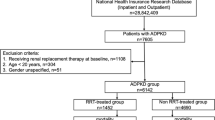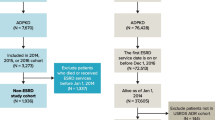Abstract
Background
Though anemia is a sign of poor renal prognosis in chronic kidney disease (CKD), hemoglobin (Hb) levels are typically higher in autosomal dominant polycystic kidney disease (ADPKD) than in other kidney diseases, and anemia has not been examined as a potential prognosticator. Thus, we investigated anemia as a factor for renal prognosis in ADPKD.
Methods
In total, 115 non-dialysis patients, 48 men and 67 women, with ADPKD were evaluated. The renal outcome of a 50% reduction in the estimated glomerular filtration rate or renal replacement therapy was examined using the Cox regression analysis and Kaplan–Meier analysis.
Results
Patients were followed for a median of 5.5 years and 50 patients had reached the end point. The mean age of the patients at the first visit was 45.9 ± 13.3 years. The overall mean Hb was 12.90 ± 1.85 g/dL, and the mean Hb in men and women was 13.82 ± 1.72 g/dL and 12.25 ± 1.65 g/dL, respectively. Hb levels and uric protein content were statistically significant factors for poor renal prognosis, while hypertension and genetic mutations failed to reach significance. Furthermore, statistical significance was found in men with Hb < 12 g/dL and in women with Hb < 11 g/dL. Anemia had significant association with kidney disease progression in patients with ADPKD.
Conclusions
We found that anemia might be a factor for poor renal prognosis in ADPKD. Furthermore, a sex difference was found, wherein men with Hb < 12 g/dL and women with Hb < 11 g/dL were at risk of renal disease progression.

Similar content being viewed by others
References
Mochizuki T, Tsuchiya K, Nitta K. Autosomal dominant polycystic kidney disease: recent advances in pathogenesis and potential therapies. Clin Exp Nephrol. 2013;17:317–26.
Johnson AM, Gabow PA. Identification of patients with autosomal dominant polycystic kidney disease at highest risk for end-stage renal disease. J Am Soc Nephrol JASN. 1997;8:1560–7.
Cornec-Le Gall E, Audrezet MP, Rousseau A, Hourmant M, Renaudineau E, Charasse C, Morin MP, Moal MC, Dantal J, Wehbe B, Perrichot R, Frouget T, Vigneau C, Potier J, Jousset P, Guillodo MP, Siohan P, Terki N, Sawadogo T, Legrand D, Menoyo-Calonge V, Benarbia S, Besnier D, Longuet H, Ferec C, Le Meur Y. The PROPKD score: a new algorithm to predict renal survival in autosomal dominant polycystic kidney disease. J Am Soc Nephrol JASN. 2016;27:942–51.
Kazmi WH, Kausz AT, Khan S, Abichandani R, Ruthazer R, Obrador GT, Pereira BJ. Anemia: an early complication of chronic renal insufficiency. Am J Kidney Dis. 2001;38:803–12.
Obrador GT, Ruthazer R, Arora P, Kausz AT, Pereira BJ. Prevalence of and factors associated with suboptimal care before initiation of dialysis in the United States. J Am Soc Nephrol JASN. 1999;10:1793–800.
Portoles J, Gorriz JL, Rubio E, de Alvaro F, Garcia F, Alvarez-Chivas V, Aranda P, Martinez-Castelao A, Group N-S. The development of anemia is associated to poor prognosis in NKF/KDOQI stage 3 chronic kidney disease. BMC Nephrol. 2013;14:2.
Drueke TB, Locatelli F, Clyne N, Eckardt KU, Macdougall IC, Tsakiris D, Burger HU, Scherhag A, Investigators C. Normalization of hemoglobin level in patients with chronic kidney disease and anemia. N Engl J Med. 2006;355:2071–84.
Chang WX, Asakawa S, Toyoki D, Nemoto Y, Morimoto C, Tamura Y, Ota T, Shibata S, Fujigaki Y, Shen ZY, Uchida S. Predictors and the subsequent risk of end-stage renal disease—usefulness of 30% decline in estimated GFR over 2 years. PLoS ONE ONE. 2015;10:e0132927.
Hoefield RA, Kalra PA, Baker P, Lane B, New JP, O'Donoghue DJ, Foley RN, Middleton RJ. Factors associated with kidney disease progression and mortality in a referred CKD population. Am J Kidney Dis. 2010;56:1072–81.
Eddington H, Hoefield R, Sinha S, Chrysochou C, Lane B, Foley RN, Hegarty J, New J, O'Donoghue DJ, Middleton RJ, Kalra PA. Serum phosphate and mortality in patients with chronic kidney disease. Clin J Am Soc Nephrol CJASN. 2010;5:2251–7.
Tsuruya K, Yoshida H, Suehiro T, Fujisaki K, Masutani K, Kitazono T. Erythropoiesis-stimulating agent slows the progression of chronic kidney disease: a possibility of a direct action of erythropoietin. Ren Fail. 2016;38:390–6.
Astor BC, Muntner P, Levin A, Eustace JA, Coresh J. Association of kidney function with anemia: the Third National Health and Nutrition Examination survey (1988–1994). Arch Intern Med. 2002;162:1401–8.
Okada K, Yanai M, Takeuchi K, Matsuyama K, Nitta K, Hayashi K, Takahashi S. Sex differences in the prevalence, progression, and improvement of chronic kidney disease. Kidney Blood Press Res. 2014;39:279–88.
Mochizuki T, Teraoka A, Akagawa H, Makabe S, Akihisa T, Sato M, Kataoka H, Mitobe M, Furukawa T, Tsuchiya K, Nitta K. Mutation analyses by next-generation sequencing and multiplex ligation-dependent probe amplification in Japanese autosomal dominant polycystic kidney disease patients. Clin Exp Nephrol. 2019. https://doi.org/10.1007/s10157-019-01736-3.
Ording AG, Sorensen HT. Concepts of comorbidities, multiple morbidities, complications, and their clinical epidemiologic analogs. Clin Epidemiol. 2013;5:199–203.
Woon C, Bielinski-Bradbury A, O'Reilly K, Robinson P. A systematic review of the predictors of disease progression in patients with autosomal dominant polycystic kidney disease. BMC Nephrol. 2015;16:140.
Griveas I, Bishop K, World M. Adult polycystic kidney disease: who needs hospital follow-up? Artif Organs. 2012;36:594–9.
Panizo N, Goicoechea M, Garcia de Vinuesa S, Arroyo D, Yuste C, Rincon A, Verdalles U, Ruiz-Caro C, Quiroga B, Luno J. Chronic kidney disease progression in patients with autosomal dominant polycystic kidney disease. Nefrologia. 2012;32:197–205.
de Almeida EA, Alho I, Marques F, Thiran C, Bicho MP, Prata M. Haemoglobin and erythropoietin levels in polycystic kidney disease. Nephrol Dial Transplant. 2008;23:412–3.
Chandra M, Miller ME, Garcia JF, Mossey RT, McVicar M. Serum immunoreactive erythropoietin levels in patients with polycystic kidney disease as compared with other hemodialysis patients. Nephron. 1985;39:26–9.
Eckardt KU, Mollmann M, Neumann R, Brunkhorst R, Burger HU, Lonnemann G, Scholz H, Keusch G, Buchholz B, Frei U, et al. Erythropoietin in polycystic kidneys. J Clin Investig. 1989;84:1160–6.
Semenza GL. Oxygen sensing, homeostasis, and disease. N Engl J Med. 2011;365:537–47.
Liu J, Wei Q, Guo C, Dong G, Liu Y, Tang C, Dong Z. Hypoxia, HIF, and associated signaling networks in chronic kidney disease. Int J Mol Sci. 2017;18(5):950.
Kraus A, Peters DJM, Klanke B, Weidemann A, Willam C, Schley G, Kunzelmann K, Eckardt KU, Buchholz B. HIF-1alpha promotes cyst progression in a mouse model of autosomal dominant polycystic kidney disease. Kidney Int. 2018;94:887–99.
Hofherr A, Busch T, Kottgen M. HIF-1alpha drives cyst growth in advanced stages of autosomal dominant polycystic kidney disease. Kidney Int. 2018;94:849–51.
Buchholz B, Schley G, Faria D, Kroening S, Willam C, Schreiber R, Klanke B, Burzlaff N, Jantsch J, Kunzelmann K, Eckardt KU. Hypoxia-inducible factor-1alpha causes renal cyst expansion through calcium-activated chloride secretion. J Am Soc Nephrol JASN. 2014;25:465–74.
Murphy WG. The sex difference in haemoglobin levels in adults - mechanisms, causes, and consequences. Blood Rev. 2014;28:41–7.
Sakashita M, Tanaka T, Nangaku M. Hypoxia-inducible factor-prolyl hydroxylase domain inhibitors to treat anemia in chronic kidney disease. Contrib Nephrol. 2019;198:112–23.
Maxwell PH, Eckardt KU. HIF prolyl hydroxylase inhibitors for the treatment of renal anaemia and beyond. Nat Rev Nephrol. 2016;12:157–68.
Acknowledgements
We express our sincere appreciation to all the patients, collaborating physicians, and other medical staff for their important contributions to the study. We particularly want to thank Ms. Naomi Iwasa for contributing to this study by collecting the clinical data. This study was supported in part by a Grant-in-Aid for Intractable Renal Diseases Research, Research on rare and intractable diseases, Health and Labour Sciences Research Grants from the Ministry of Health, Labour and Welfare of Japan.
Author information
Authors and Affiliations
Corresponding author
Ethics declarations
Conflict of interest
Toshio Mochizuki and Ken Tsuchiya received travel fees and honoraria for lectures from Otsuka Pharmaceutical Co. Toshio Mochizuki and Hiroshi Kataoka belong to an endowed department sponsored by Otsuka Pharmaceutical Co, Chugai Pharmaceutical Co, Kyowa Hakko Kirin Co, and JMS Co.
Research involving human participants and/or animals
All procedures were approved by the research ethics committee of Tokyo Women’s Medical University (No. 196B) in accordance with the 1964 Declaration of Helsinki and its later amendments, or with comparable ethical standards.
Informed consent
Written informed consent was obtained from all participants included in the study.
Additional information
Publisher's Note
Springer Nature remains neutral with regard to jurisdictional claims in published maps and institutional affiliations.
About this article
Cite this article
Ushio, Y., Kataoka, H., Sato, M. et al. Association between anemia and renal prognosis in autosomal dominant polycystic kidney disease: a retrospective study. Clin Exp Nephrol 24, 500–508 (2020). https://doi.org/10.1007/s10157-020-01856-1
Received:
Accepted:
Published:
Issue Date:
DOI: https://doi.org/10.1007/s10157-020-01856-1




